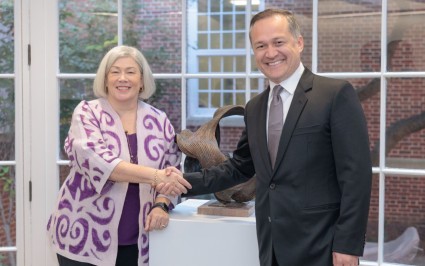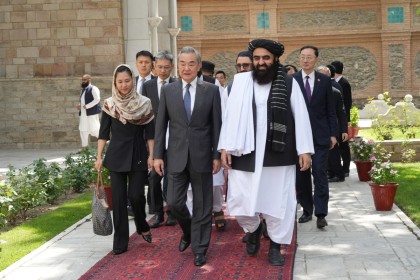The Biden administration asked three Central Asian nations to temporarily house thousands of Afghans who worked with American forces and could be targeted by the Taliban as U.S. and NATO troops withdraw after nearly two decades.
The U.S. has asked Kazakhstan, Tajikistan and Uzbekistan to take in about 9,000 Afghans who assisted with the American military’s invasion and occupation of the country, according to three people familiar with the request, who asked not to be identified discussing private deliberations.
That effort comes as U.S. forces handed over Bagram Air Base, their biggest facility, late Thursday night in a milestone symbolizing the effective departure of combat forces from Afghanistan after 20 years. The U.S. had said it would have most troops out by Sept. 11, keeping a contingent of about 650 in the country to protect diplomats, but Pentagon spokesman John Kirby on Friday said the withdrawal could be completed by the end of August.
“All Coalition and American troops departed Bagram Air Base last night,” Fawad Aman, a deputy spokesman for Afghanistan’s defense ministry, said. “The base was handed over. ANDSF will protect the base and use it to combat terrorism,” he added, using an acronym for the Afghan National Defense and Security Forces.
But the handover raises the potential threats facing the many Afghan translators, drivers and other workers and their families who helped sustain the American presence after the U.S.-led coalition ousted the Taliban government following the Sept. 11, 2001 terror attacks. The Biden administration pledged to expedite immigration visas for Afghans who worked closely with U.S. forces, but that process is still in flux.
“All the visa seekers are surprised by this news and we are hoping they shift us swiftly as the security is really worsening and those countries are much safer than Afghanistan,” Amin Rahimi, an Afghan employee of a U.S. government-funded project, said by phone on Friday.
Having gained strength for years despite the American and NATO presence, Taliban forces now control half of the country’s 400 districts.
A crucial way for the U.S. to aid key Afghan allies would be through the Special Immigrant Visa program, which allows those who have worked for American forces to claim refugee status. Officials have said there are some 18,000 Afghan SIV applicants, with 9,000 or so just starting the process.
State Department spokesman Ned Price declined to say at a briefing Thursday where the applicants might go. He said they and their families “will have the option to be relocated to a location outside of Afghanistan before we complete our military drawdown by September” to complete the immigration process.
‘Every Option’
“Importantly, these are individuals who are already in the SIV pipeline,” Price said. “We would undertake any relocation in full compliance with applicable laws and in full coordination with Congress.”
Pentagon spokesman Kirby on Friday said the U.S. was in talks with “neighboring nations” to Afghanistan about potentially relocating people who had aided American troops.
Some officials had suggested the idea of sending those Afghans to the U.S. island of Guam in the Pacific, and the island’s governor even tweeted that he was in favor of the idea. But that was never seriously considered given officials’ fear that if the visa applicants went to Guam, it would be impossible to force them to leave if their SIV applications were denied.
Secretary of State Antony Blinken met Uzbek Foreign Minister Abdulaziz Kamilov and Tajik Foreign Minister Sirojiddin Muhriddin at the State Department on Thursday. Blinken thanked Kamilov “for Uzbekistan’s continued support for a just and durable peace settlement in Afghanistan,” the department said in a statement.
Testifying before the House Foreign Affairs Committee in June, Blinken said a backlog of immigration applications is being cleared, and he asked Congress to raise a cap on special immigrant visas for Afghans by 8,000 slots. There’s now a congressionally mandated cap of 26,000 slots under the Special Immigrant Visa program.
The agreement being sought to temporarily base thousands of Afghans in three Central Asian nations would be part of a broader deal to establish further cooperation with those countries. As part of the visit by the Uzbek and Tajik foreign ministers in Washington this week, the U.S. is proposing an accord that would allow it to conduct intelligence, surveillance and reconnaissance operations from their territory, one of the people familiar with the request said.














